
BIODEGRADATION
Scope & Guideline
Leading the way in biodegradation science for a healthier planet.
Introduction
Aims and Scopes
- Microbial Biodegradation Mechanisms:
Research on the specific microbial processes involved in the degradation of various pollutants, including plastics, pharmaceuticals, and hydrocarbons. - Enzyme and Biocatalyst Applications:
Exploration of enzymes and biocatalysts, particularly laccases and other ligninolytic enzymes, in enhancing biodegradation rates and efficiencies. - Bioremediation Strategies:
Development of innovative bioremediation techniques for contaminated environments, including the use of microbial consortia, bioaugmentation, and phytoremediation. - Impact of Environmental Factors:
Investigation of how environmental conditions, such as temperature, pH, and the presence of co-contaminants, affect microbial degradation processes. - Sustainable Waste Management:
Focus on the integration of biodegradation processes in waste management practices, particularly in relation to organic waste and plastic pollution.
Trending and Emerging
- Microbial Consortia and Synergistic Effects:
There is an increasing focus on the use of microbial consortia to enhance biodegradation, emphasizing the synergistic interactions among different species. - Biodegradation of Plastics:
Research on the biodegradation of synthetic plastics, particularly biodegradable and non-biodegradable plastics, is gaining significant momentum due to environmental concerns. - Waste-to-Energy Technologies:
Emerging themes include the integration of biodegradation processes with energy recovery systems, such as microbial fuel cells and anaerobic digestion for biogas production. - Metagenomic and Metabolomic Analyses:
The application of advanced molecular techniques, including metagenomics and metabolomics, is trending, providing deeper insights into microbial communities and degradation pathways. - Circular Economy and Biodegradation:
A growing emphasis on the role of biodegradation in circular economy frameworks highlights research on waste valorization and sustainable resource use through biological processes.
Declining or Waning
- Traditional Chemical Degradation Studies:
Research focusing solely on chemical degradation processes without biological involvement has decreased, as the emphasis shifts towards integrated biological approaches. - Single Organism Studies:
There is a noticeable reduction in studies centered on the biodegradation capabilities of single microbial species, with a growing preference for examining complex microbial communities. - Static Laboratory Experiments:
Research relying solely on static laboratory experiments for biodegradation assessments is less prevalent, as field studies and real-world applications gain importance. - Focus on Legacy Pollutants:
The emphasis on studying legacy pollutants like DDT and PCBs is declining, as newer contaminants such as microplastics and pharmaceuticals become more relevant. - Limited Scope of Ecotoxicological Assessments:
Research on the ecotoxicological effects of biodegradation products is diminishing, as the focus increasingly shifts towards holistic environmental impact assessments.
Similar Journals
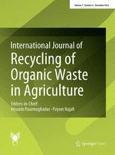
International Journal Of Recycling of Organic Waste in Agriculture
Empowering Agriculture through Waste Recycling InnovationInternational Journal of Recycling of Organic Waste in Agriculture is a pioneering open-access journal, established in 2012 and published by the Islamic Azad University, Isfahan-Khorasgan Branch, Iran. With ISSN 2195-3228 and E-ISSN 2251-7715, this journal focuses on innovative research and development in the field of organic waste recycling within agricultural contexts. As indicated by its latest metrics, it holds a respectable ranking in the Q2 quartile in Agricultural and Biological Sciences and Q3 in Waste Management and Disposal for 2023. This positions the journal as a valuable resource for professionals, researchers, and students invested in sustainable agricultural practices and waste management strategies. With its commitment to advancing knowledge and fostering interdisciplinary dialogue, the journal serves as an essential platform for disseminating significant findings that can positively impact environmental sustainability and agricultural productivity worldwide.
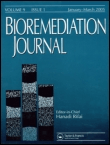
BIOREMEDIATION JOURNAL
Pioneering the Future of Pollution Cleanup with Cutting-Edge Insights.BIOREMEDIATION JOURNAL, published by Taylor & Francis Inc, is a premier platform for scholars and practitioners in the field of environmental science, specifically focusing on bioremediation processes and their applications. With an impressive impact factor reflected in its Q2 ranking in Environmental Science (miscellaneous category) and a commendable Scopus Ranking of #70 out of 233, this journal serves as an essential resource for advancing knowledge and innovation in the remediation of contaminated environments. Since its inception in 1997, it has fostered the dissemination of high-quality research and technical studies, making significant contributions to our understanding of microbial and biotechnological methods for pollution cleanup. Researchers and professionals seeking to stay at the forefront of bioremediation advancements will find invaluable insights and methodologies within its pages, all accessible through traditional subscription-based options, ensuring a broad distribution of impactful research findings.

AIMS Microbiology
Advancing microbiological research for a healthier tomorrow.AIMS Microbiology, published by the American Institute of Mathematical Sciences (AIMS), is an esteemed Open Access journal dedicated to advancing the field of microbiology since its inception in 2015. With an ISSN of 2471-1888, the journal aims to disseminate high-quality research and innovative findings pertaining to both fundamental and applied microbiology, encompassing areas such as medical microbiology, immunology, and related life sciences. Recognized for its academic rigor, AIMS Microbiology has achieved a significant standing, evidenced by its current Q2 ranking in both Microbiology and Medical Microbiology categories, along with impressive percentile rankings within prestigious Scopus metrics. Based in the United States, the journal not only emphasizes accessibility and widespread dissemination of knowledge but also plays a crucial role in fostering collaboration among researchers and professionals in the microbiological sciences. By providing a platform for collaborative research and innovative ideas, AIMS Microbiology is poised to influence the future development and application of microbiological research, making it a valuable resource for students, researchers, and practitioners alike.
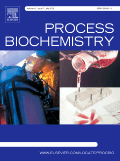
PROCESS BIOCHEMISTRY
Advancing biochemical innovation for a sustainable future.PROCESS BIOCHEMISTRY is a premier journal published by Elsevier Science Ltd, dedicated to advancing the field of biochemistry, microbiology, and bioengineering. With an ISSN of 1359-5113 and an E-ISSN of 1873-3298, this renowned journal is recognized for its impactful contributions, as demonstrated by its Q2 ranking in Applied Microbiology and Biotechnology, Biochemistry, and Bioengineering categories as of 2023. Covering a wide array of topics since its inception in 1950, PROCESS BIOCHEMISTRY serves as a crucial platform for researchers and professionals to disseminate innovative findings and develop new insights in enzyme technology, metabolic pathways, and bioreactor design. Although the journal operates under a non-open access policy, it remains vital for those engaged in cutting-edge biochemical research and development. Located in the United Kingdom, it continues to facilitate scientific discourse and foster collaboration among industry experts and academic scholars worldwide.
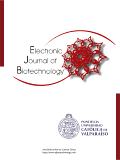
ELECTRONIC JOURNAL OF BIOTECHNOLOGY
Bridging Science and Practice for a Sustainable FutureThe Electronic Journal of Biotechnology is a premier Open Access journal published by Pontificia Universidad Catolica de Valparaiso, Chile, dedicated to advancing the fields of applied microbiology and biotechnology. With its inception in 1998 and an unwavering commitment to sharing knowledge, the journal has garnered a respectable ranking within the Q3 quartile for both its biotechnology and applied microbiology categories as of 2023, reflecting its significance in the academic community. Researchers and professionals will find its editorial rigor complemented by a robust platform for disseminating innovative findings, fostering collaboration, and driving forward biotechnology discussions. Given its inclusive approach, having transitioned to Open Access in 2014, the journal ensures that research is accessible to a global audience, making it a valuable resource for students, academics, and industry practitioners alike. Through the publication of original research, reviews, and critical insights, the Electronic Journal of Biotechnology aims to bridge the gap between scientific discovery and practical application, ultimately contributing to advancements in health, agriculture, and environmental sustainability.

BIOLOGY AND ENVIRONMENT-PROCEEDINGS OF THE ROYAL IRISH ACADEMY
Exploring Ecological Insights for a Sustainable FutureBIOLOGY AND ENVIRONMENT - PROCEEDINGS OF THE ROYAL IRISH ACADEMY serves as a vital platform for advancing knowledge in the rapidly evolving fields of biological and environmental sciences. Published by the esteemed Royal Irish Academy, this journal, with an ISSN of 0791-7945 and an E-ISSN of 2009-003X, offers a rich compilation of research articles, reviews, and proceedings that cater to the academic community in Ireland and beyond. Since its inception in 1993 and continuing through to 2024, the journal has positioned itself as a valuable resource within the Q4 category in Agricultural and Biological Sciences and Environmental Science, as detailed by the 2023 Scopus rankings. While not currently offering open access, its contributions significantly impact understanding and discussions surrounding ecological and biological challenges. Researchers, professionals, and students alike will find that the journal not only reflects current trends, but also pushes the boundaries of research, making it an essential read for anyone invested in the study of the natural world.
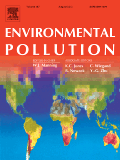
ENVIRONMENTAL POLLUTION
Exploring solutions for a cleaner, healthier planet.Environmental Pollution, published by Elsevier Science Ltd, stands at the forefront of research related to environmental contaminants and their effects on health and ecosystems. With an impressive impact factor reflected in its Q1 rankings across various categories including Health, Toxicology, and Pollution, this journal is a pivotal resource for academics and professionals in the fields of environmental science and toxicology. The journal, established in 1973, continues to disseminate high-quality articles that explore the implications of pollution and advance knowledge on toxicological impacts and mitigation strategies. Although it is not an open-access journal, it offers robust visibility within the scientific community, ensuring vital research reaches those who need it most. Researchers, students, and professionals dedicated to understanding and addressing the challenges of environmental pollution will find Environmental Pollution to be an indispensable platform for their work, guiding the ongoing dialogue on sustainable practices and public health protection.

Synthetic and Systems Biotechnology
Empowering Global Access to Groundbreaking ResearchSynthetic and Systems Biotechnology, published by KEAI PUBLISHING LTD, is a pioneering open-access journal that has made significant contributions to the fields of applied microbiology, biotechnology, biomedical engineering, genetics, and structural biology since its inception in 2016. With an ISSN of 2405-805X, this journal is committed to fostering innovative research and interdisciplinary collaboration, providing a platform for the dissemination of high-quality studies that push the boundaries of scientific knowledge. Recognized for its excellence, it holds prestigious Q1 rankings in both Applied Microbiology and Biotechnology as well as Biomedical Engineering in 2023, alongside notable Q2 rankings in Genetics and Structural Biology. Researchers, professionals, and students alike can access cutting-edge research that explores the dynamic interplay between synthetic biology and systems biology, driving advancements that could reshape health, industry, and environmental sustainability. By operating under an open-access model, Synthetic and Systems Biotechnology ensures that new findings are accessible to a global audience, thereby maximizing the impact and reach of the published work and paving the way for future discoveries.
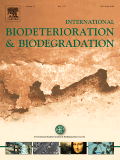
INTERNATIONAL BIODETERIORATION & BIODEGRADATION
Transforming waste management through scientific discovery.INTERNATIONAL BIODETERIORATION & BIODEGRADATION, published by Elsevier Science Ltd, is a prestigious peer-reviewed journal dedicated to the field of environmental science, particularly focusing on the biodegradation processes of materials and the bio-deterioration of various substances. With an ISSN of 0964-8305 and E-ISSN 1879-0208, this journal has established itself as a vital resource in areas such as biomaterials, microbiology, and waste management, holding a commendable Q2 ranking across multiple categories. Converging its studies from 1992 to 2025, it offers authors the opportunity to disseminate their research findings to a broad audience of researchers, professionals, and students committed to sustainability and environmental stewardship. The journal's impressive Scopus rankings reveal its significant impact within the academic community, with notable percentiles in both Waste Management and Microbiology. Although it does not offer open access options, the wealth of knowledge published within its pages is invaluable for advancing research and methodologies in bioremediation and waste management strategies.

International Journal of Environmental Science and Technology
Elevating the discourse on environmental sustainability.International Journal of Environmental Science and Technology, published by SPRINGER, stands as a premier platform for the dissemination of cutting-edge research in the fields of environmental science, technology, and engineering. With an impressive scope spanning from 2005 to 2024, this journal serves as a vital resource for academic and professional communities engaged in tackling pressing environmental challenges. It boasts a strong reputation, evidenced by its Q1 ranking in Agricultural and Biological Sciences and solid placements in Environmental Chemistry and Engineering. Researchers searching for high-impact studies will find the journal's contributions significant, as reflected in its rankings within Scopus: 34th percentile in Agricultural and Biological Sciences and notable standings in Environmental Engineering and Chemistry. Although the journal is not currently an Open Access resource, it maintains a commitment to academic rigor and innovation, making it indispensable for those devoted to advancing knowledge in environmental sustainability and technology.